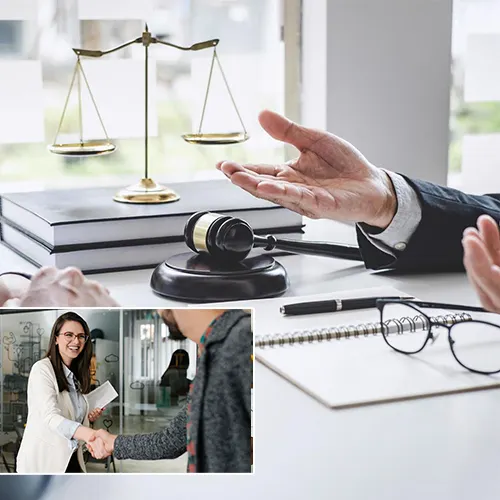Understanding the DUI Prosecutor Role: Key Functions Duties
Table of Contents []
DUI Prosecutor Role
Understanding the DUI Prosecutor's Crucial Position within the Legal Landscape

When it comes to the legal process, few figures are as pivotal as the DUI prosecutor. These legal professionals carry the weighty responsibility of presenting the state's case against individuals charged with driving under the influence (DUI). The role they play is not just about arguing in court; it requires a deep understanding of the law, meticulous evidence gathering, and strategic case-building. At Akins Nowlin & Prewitt, we recognize the value of understanding the DUI prosecutor's role and strategy, as it can significantly impact the defense approach.
DUI prosecutions are no small matter-they involve the careful analysis of police reports, breathalyzer data, and witness testimonies. Prosecutors must maintain an unbiased stance while also aiming for a fair outcome that benefits public safety. It's a tough job, but knowing the ins and outs of their methods provides critical insight for crafting an effective defense. For those facing DUI charges, Akins Nowlin & Prewitt connects you with top-notch attorneys who are fluent in handling challenging prosecutions. Throughout the nation, we're here to shed light on this process, and we're just a call away at (512) 244-0001. Whether you've got questions or need to book an appointment, our team is ready to assist.
Key Responsibilities of a DUI Prosecutor
At the heart of every DUI case is a prosecutor with a list of responsibilities. They're tasked with reviewing all the evidence collected during the arrest, including breathalyzer results, field sobriety tests, and any additional footage or testimonies available. Their job is to ensure that all the evidence was obtained legally and is admissible in court. This attention to detail is imperative to uphold justice.
A DUI prosecutor doesn't just show up in court; they are involved from the very beginning, sometimes even working with law enforcement prior to an arrest. They're the ones who decide whether to file charges based on the evidence available, and that decision sets the entire trial process into motion.
Developing a Prosecutorial Strategy
Strategy is key for any prosecutor, especially in DUI cases. These professionals have to evaluate the strength of the evidence, identify potential weak spots, and plan how to address them during trial. One of their main goals is to prove beyond a reasonable doubt that the defendant was operating a vehicle under the influence. It's like a complex puzzle, and every piece has to fit just right for the prosecution to present a strong case.
In forming their strategy, they might look at prior DUI records, patterns of behavior, and the specific circumstances that led to the arrest. Through this lens, they tailor their approach, often anticipating the defense's counterarguments in order to stay one step ahead.
The Prosecution's Impact on Negotiations and Plea Bargains
Not all DUI cases go to trial; in fact, many are resolved through plea bargains. In these situations, the prosecutor has significant influence. They may work with the defense attorney to reach an agreement that serves justice while also considering the resources of the court. This can mean lesser charges for the defendant in exchange for a guilty plea, sparing both parties the uncertainty of a trial.
However, let's not forget that plea bargains are not giveaways. Prosecutors scrutinize the evidence before offering a deal, as they must maintain their commitment to public safety. Strong evidence can equate to less negotiating room for the defendant, making the prosecutor's role in the process even more critical.
Evaluating Evidence: The Backbone of the Prosecutor's Case

The backbone of any DUI case lies in the evidence, and it's up to the prosecutor to ensure it's robust enough to withstand the scrutiny of the defense. Evaluating evidence is a painstaking task, requiring an eye for detail and a comprehensive understanding of DUI laws. With Akins Nowlin & Prewitt, we illuminate this aspect of the legal process to help those facing charges better prepare for what's ahead.
From scrutinizing the smallest details of a police report to assessing the validity of breathalyzer test results, the evidence tells the story the prosecutor will present in court. It encompasses everything from tangible proof like blood alcohol content to the subjective observations of the arresting officer. Understanding this evidence is crucial for both the prosecution's case and the defense's rebuttal.
The Significance of Breathalyzer and Field Sobriety Test Results
Breathalyzer and field sobriety test results often form the crux of a DUI case. These tests are designed to provide empirical evidence of intoxication. But they're not infallible. Prosecutors must vet these results, ensuring that the devices were calibrated and administered correctly. This reliability is what gives the evidence credence in a court of law.
Even the procedures surrounding these tests can come into question. The administration of a field sobriety test, for example, has strict guidelines. Deviation from these protocols can impact the outcome of a case, so a prosecutor must be thorough in their review.
Diving into Police Reports and Witness Statements
Police reports and witness statements offer a narrative that can substantiate the charge of DUI. A prosecutor analyzes these accounts, looking for consistency and accuracy to build a foundation for their case. Yet every story has two sides. An adept prosecutor will anticipate alternate interpretations and prepare to counter any discrepancies.
It's key that witness credibility is assessed-prosecutors often judge the reliability of these accounts, knowing that the defense will scrutinize each witness's testimony. Any crack in the story can be a potential weak point that the defense will exploit.
Video Evidence and Its Role in Court
In the digital age, video evidence is increasingly common in DUI cases. From dashcams to bodycams, these recordings provide an unfiltered view of the events in question. Prosecutors review this footage thoroughly, ensuring it supports the case they intend to present and checking for any potential legal issues related to privacy concerns or the manner in which the evidence was gathered.
These recordings can be powerful in court; they offer a real-time account of the defendant's conduct and interaction with law enforcement. What was captured on camera often becomes a point of contention, and for good reason. Sight and sound combined can be incredibly persuasive to a jury.
Balancing Justice and Mercy: The Prosecutor's Discretionary Power

The perplexing balance between justice and mercy is something DUI prosecutors across the nation grapple with regularly. While seeking a conviction, they must also consider the individual circumstances of each case. This is where their discretionary power comes into play, allowing them the latitude to determine the most appropriate course of action. Our Akins Nowlin & Prewitt team can guide you through these sometimes-murky waters, giving you the support and advocacy you deserve.
Prosecutors have to ask tough questions. Should they push for the maximum penalty, or are there extenuating factors that call for leniency? This delicate dance requires a profound sense of fairness and a commitment to serving the community. It demonstrates why having an experienced defense attorney is so crucial in navigating these nuanced decisions.
The Weight of Prior Offenses on Sentencing Recommendations
When a prior DUI offense is in the picture, the stakes are undoubtedly higher. Prosecutors consider an individual's past as a measure of their willingness to abide by the law. This history can significantly influence the severity of their sentencing recommendations. However, it's not always cut-and-dry-heavy factors can sometimes tilt the scales toward a more merciful outcome.
It's essential for prosecutors to differentiate between a one-time mistake and a pattern of reckless behavior. A fair and just prosecution isn't about punitive measures alone; it's about finding a resolution that ideally prevents future offenses and protects the community.
The Dynamic of Victim Impact Statements
In DUI cases where there's injury or fatality, victim impact statements become an integral part of the process. Prosecutors must weigh these heartfelt accounts, which often convey the profound emotional and physical toll of the defendant's actions. These statements can sway sentencing and push for harsher penalties.
On the flip side, these personal stories can also inspire a prosecutor to seek rehabilitation options over incarceration, particularly if it's a situation where restorative justice may serve a better purpose. It becomes a question of not only what suits the law, but what's in the best interest of all parties involved.
Considering Alternative Sentencing and Rehabilitation Programs
Punishment or rehabilitation? That's a question every DUI prosecutor faces. In some situations, alternative sentencing, such as community service or substance abuse programs, may be more effective than jail time. A smart prosecutor considers the potential for rehabilitation, taking into account the defendant's willingness to learn from their mistakes and make amends.
By choosing alternatives to incarceration, prosecutors may help reduce recidivism and support individuals in making positive changes. It's a nuanced approach that demonstrates comprehension of the broader social implications of legal decisions.
Closing the Case: Final Arguments and the Pursuit of Conviction

In the tense atmosphere of the courtroom, the prosecutor's final arguments act as the culmination of all their efforts. They've sifted through evidence, developed strategy, and now they must present their case with compelling clarity to convince the jury of the defendant's guilt. At Akins Nowlin & Prewitt, we expertly maneuver through these prosecutorial tactics, ensuring you have a powerhouse defense ready to stand firm against the tough prosecutions. Curious about your options or need to consult with a legal expert? Our national team is here for you at (512) 244-0001.
Final arguments are the prosecutor's last chance to make their case. They summarize the critical points, underline the reliability of the evidence, and remind the jury of the law's demands. The prosecutor must be persuasive but also maintain the integrity of the legal process. It's a dance between the art of rhetoric and the rigidity of legal standards.
The Art of Persuasion in Final Arguments
In their final arguments, prosecutors use every rhetorical tool at their disposal. They craft a narrative that's both factual and emotionally resonant, seeking to leave an indelible impression on the jury. Every word counts, and the power of persuasion cannot be underestimated in these crucial moments.
A well-delivered final argument can sway a jury's opinion, solidifying the prosecutor's case. This stage of the trial underscores why having a skilled defense attorney is paramount-they provide the necessary counterweight, challenging the prosecution's assertions and advocating for the defendant's side of the story.
The Impact of Jury Deliberation on the Prosecutor's Strategy
As the jury retreats to deliberate, the prosecutor's strategy extends beyond the courtroom walls. They've laid the groundwork, but now it's up to the jurors to dissect and discuss the case at hand. A successful prosecution often hinges on how well each juror understands the arguments and evidence presented.
The prosecutor's goal is to ensure that the narrative remains clear and convincing, even in their absence. They strive to leave a lasting impression, one that resonates with the jurors as they reach their verdict. It's a testament to the prosecutor's ability to communicate effectively and present a solid, fact-based case.
When a Verdict is Reached: The Role of the Prosecutor Post-Trial
Once a verdict is reached, the prosecutor's role shifts from advocate to administrator. If the defendant is found guilty, they must be prepared to offer sentencing recommendations. They take into account all facets of the case, the impact on the community, and the need for justice to be served.
In the event of an acquittal, the prosecutor must accept the jury's decision and uphold the principles of the legal system. It's a reminder of the essential balance between the prosecution's aim for conviction and the defendant's right to a fair trial.
Connect With Akins Nowlin & Prewitt for Your DUI Defense

Regardless of where you stand in the legal process, the role of the DUI prosecutor cannot be overstated. It's crucial to have a team that knows the playbook inside and out and can tackle tough prosecutions head-on. Let Akins Nowlin & Prewitt be your ally in these complex legal battles. Our commitment to education, coupled with our network of seasoned attorneys, ensures that you're equipped with the best defense strategy.
We believe everyone deserves exemplary legal representation, regardless of the charges they face. To learn more, ask questions, or schedule an appointment, reach out to us anytime. Our national service is at your fingertips with just a call to (512) 244-0001. Remember, the right defense can make all the difference. Don't wait; reach out to Akins Nowlin & Prewitt today, and let us stand by your side in pursuing a favorable outcome.
